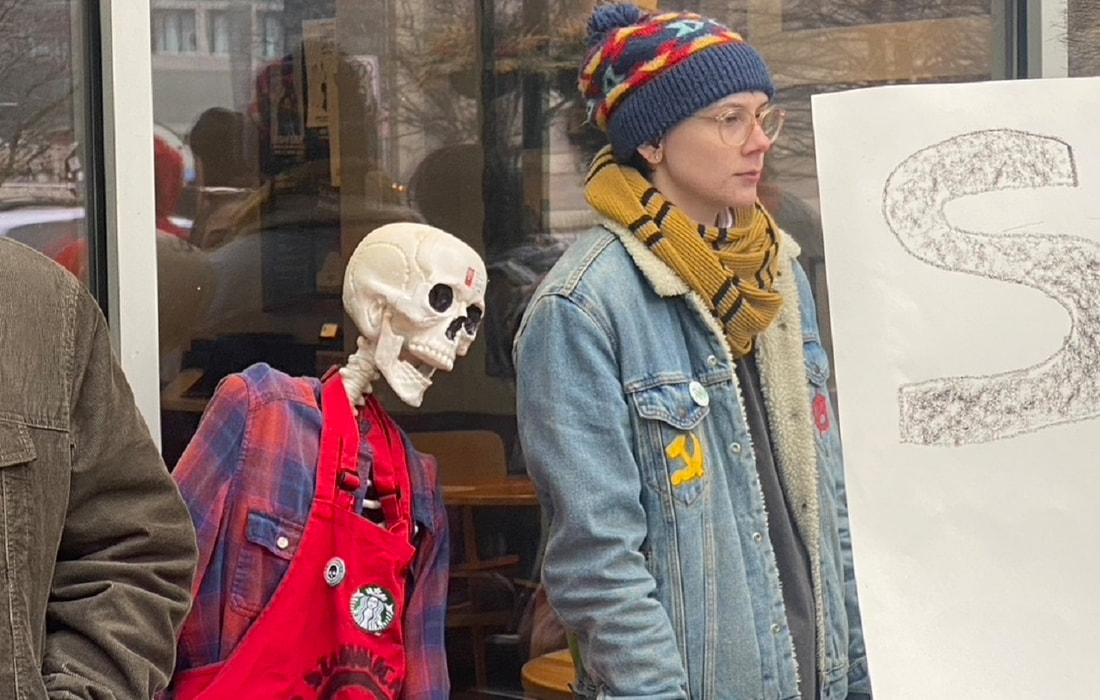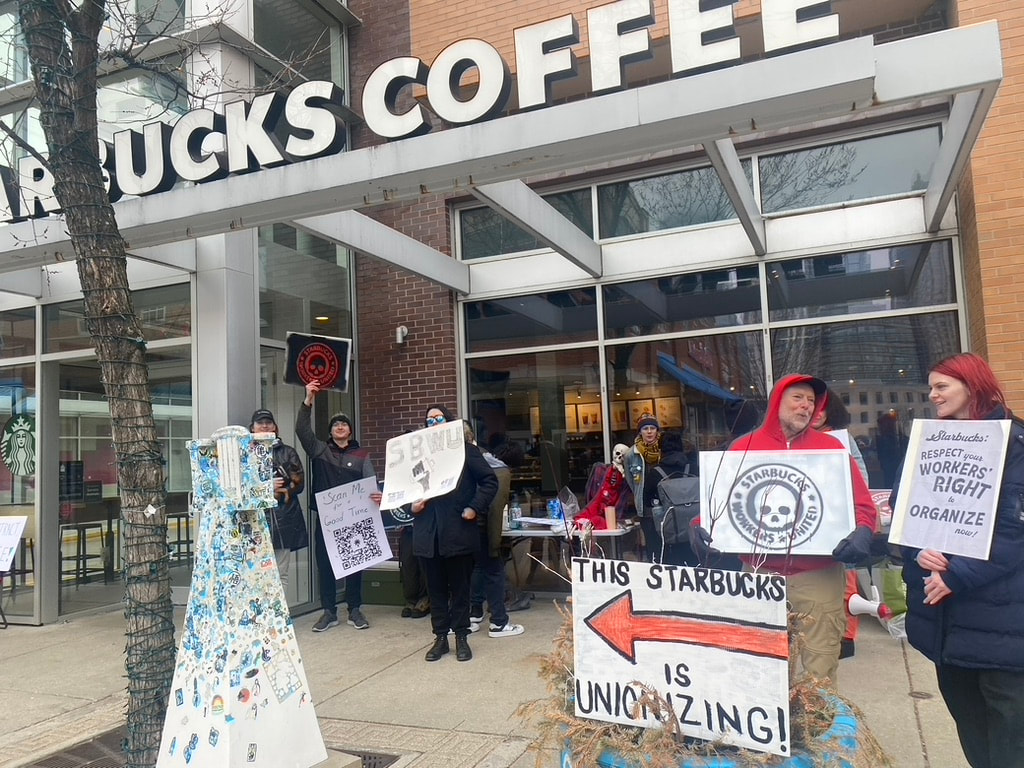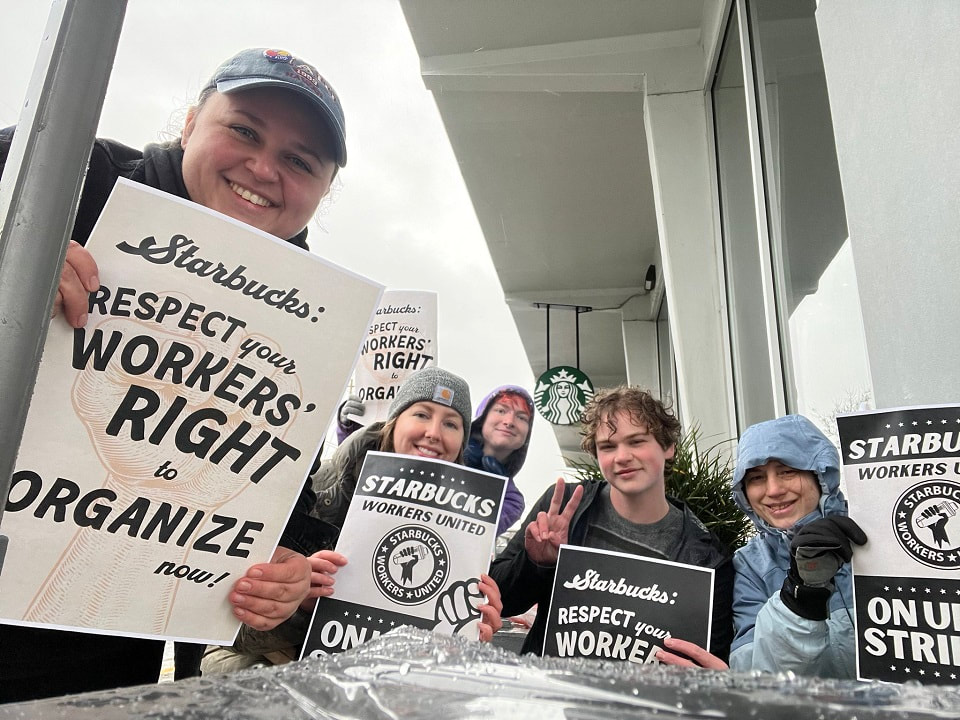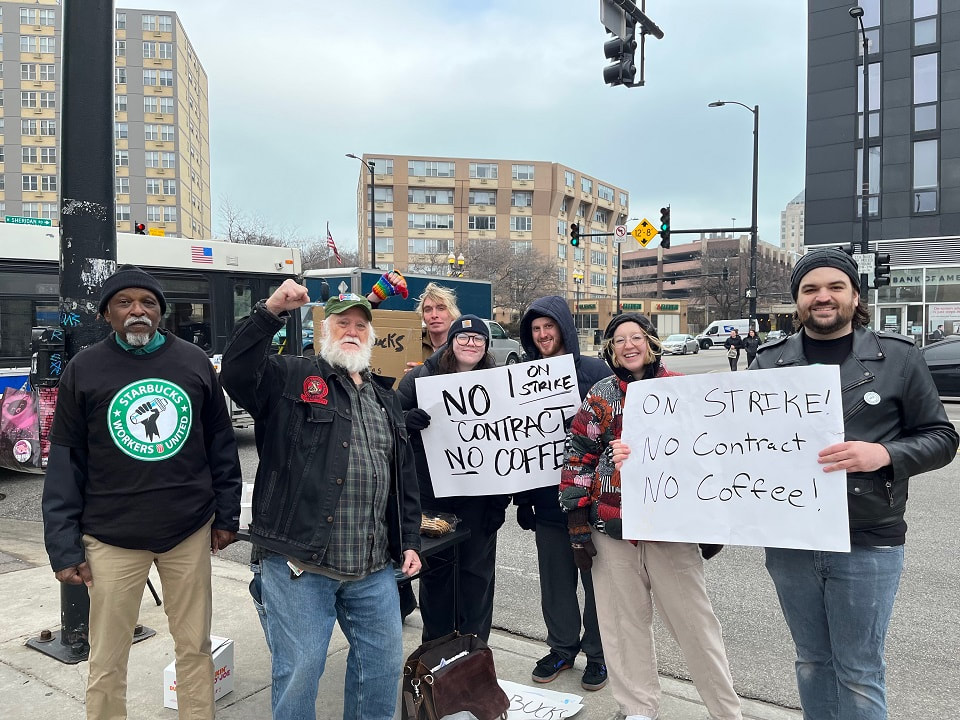|
3/26/2023 Starbucks workers take nationwide coffee break and walk off the job. By: Mark Gruenberg, John Bachtell, Roberta Wood & Scott MarshallRead NowStriking Starbucks workers took the lovable skeleton mascot out of the closet where their bosses had confined it, saying the skeleton was treated as badly as the workers. | Roberta Wood/PW CHICAGO — How did Marvin, a lovable skeleton, become the mascot of striking Starbucks workers in this city’s historic Greektown neighborhood? This location is blocks north of the giant University of Illinois campus. It is one of more than a hundred stores in the country where the workers filed for union representation and voted to join today’s strike, even before the NLRB had a chance to schedule their union recognition vote. According to the baristas here, management’s treatment of Marvin corresponds to their treatment of the workers and their community. Marvin “came to life” one year during the Halloween season when workers hung Marvin in the window, and he became a neighborhood fixture, decked out to celebrate whatever holiday was going on, bringing smiles to the faces of both staff and community. “But then Starbucks District Manager Lesley Davis said we couldn’t have him,” explained Chris Allen, 22, a shift supervisor. Davis banished the beloved Marvin to the back of the house, out of sight. “It sucks having someone else make all the decisions when you’re doing all the work daily,” Lily Haneghan, 23, told People’s World. Haneghan admitted when co-workers first discussed forming a union, she was scared. “I had no idea what a union was, and then my boss said, ‘If you unionize, you will get fired.’” That was a big threat to someone who had invested the last five years of her young life working for the company. But then she reflected, “They think of us as coffee robots. There’s no concern for our physical and emotional well-being.” Haneghan and Allen were co-strike captains.
The national Starbucks strike on March 22, at more than 115 stores from Anchorage and Arkansas to Seattle and Phoenix, preceded the showdown at the firm’s annual meeting over whether its union-busting is hurting the so-called progressive coffee chain’s brand. The baristas and their allies walked out to protest the firm’s rampant labor law-breaking, orchestrated and directed by longtime CEO Howard Schultz. The labor law-breaking prompted union pension funds and pro-stockholder investors to demand an independent audit of the impact of the law-breaking, which also defies the firm’s proclaimed standards. The proposal came up at its Zoomed annual meeting on March 23. “The faux progressivism of Starbucks is being exposed for what it is: A marketing ploy,” said Starbucks Workers United (SWU), the union-sponsored group aiding the grass-roots organizing drive nationally. The National Labor Relations Board filed federal charges against Schultz personally and over 500 charges it levied against the company. The number of complaints from exploited Starbucks workers to the NLRB is 1,200 and counting. “The One Day Longer national unfair labor practices (ULP) strike demanded Starbucks fully staff all stores, give partners a real seat at the table, not an empty chair, and negotiate a contract in good faith,” SWU said. That’s exactly what Schultz, his union-buster lawyers, and his managers haven’t done. The only two bargaining sessions the two sides ever had—after pressure on Schultz—lasted five minutes each, with the bosses, led by the union buster, walking out.
More than six years with Starbucks Sean Plotts has worked six and a half years for Starbucks, including two and a half years as a shift manager at the Lincoln Village location in Chicago. A recent graduate, he holds an associate in arts degree from McHenry County College. “They were once cutting edge in the fast food industry, but other companies have caught up. They are brutally cracking down on stores going union,” said Plotts. Less than 300 stores are unionized out of 28,000, and 900 unfair labor practices are already filed with NLRB. “All we’re asking,” Plotts said, “is to be treated fairly, paid well for our services, and given the resources to serve the public. We love this job, but it’s stressful when they’re cutting hours and cutting floor coverage to save a couple of extra bucks at the end of the day.” Plotts described this as a “union-busting” tactic, adding, “They want to flush out many tired employees. We’re all tired. People shouldn’t have to work as long as they do for little pay just so the stores can get a couple hundred more dollars at the end of the day.” So far, Starbucks refuses to recognize the union at the Lincoln Village location. “We’ve had one bargaining session which lasted eight minutes, including introductions,” said Plotts, who expressed gratitude for public support for the strikers. Shot the hours back Another Lincoln Village worker, Autumn Graham, who sports shoulder-length hair, has been with Starbucks for five years. He started in St. Louis and moved to Chicago because of a toxic work environment at the store there. “I worked at a store on Bryn Mawr Avenue (in Chicago),” he said. “We unionized in May, and they shut us down in October. We and the Clark and Ridge store were the first to organize in Chicago. They just stonewalled us. Cutting our work without telling us anything and then shutting it down and assigning us to other stores. Graham depends on Starbucks’ health benefits, as meager as they are, and needs to work full-time to pay his bills. The company has slashed his hours, making life difficult. “If you work 20 hours, you get benefits. Many workers struggle to get to 20, only get 17, and are denied benefits. When we unionized, they cut our hours from 20-25 to 15 hours and denied us benefits,” he said. “Recently, they shot the hours back up because we’ve lost a lot of staff. They say business is slow, but I know from the receipts that we’re as busy as before. They ask us to do more with fewer people,” said Graham. “If you’re a Starbucks customer, just fill out the review on your receipt and write ‘support the union, come to the negotiating table,'” he said. “They need to quit making excuses.” Across the country, workers in 24 stores in California—including two in Sacramento and one each in Berkeley, Los Angeles, and San Francisco—joined them. Back East, so did workers in Boston, six stores in metro D.C., three in the Baltimore area, Philadelphia, Pittsburgh, Detroit and Flint, Mich., Buffalo, St. Louis, and St. Paul, Minn., among others. “As Starbucks celebrates their provenance and record profits this week, my partners have to deal with the reality that we are being nickeled and dimed to extract as much labor as cheaply as possible,” said Maria Flores of Queens, N.Y. “Our shift supervisors, who make maybe $4 more an hour than baristas, are being met with resistance when picking up barista shifts or working with other shift supervisors, and they’re struggling. Where is the disconnect? “I’m striking because the power of workers can save the world. Our union is small but now unstoppable, and we’re ready to start making moves. The walls are closing in on Starbucks and when we negotiate I think the flood gates might open!” “Workers unite!” her Queens colleague James Carr predicted. “I’m excited to get out onto the streets with the people, enjoy the weather, and withhold my labor from Starbucks.” “I’m excited to join the national effort in striking! It’s so reassuring and reaffirming to be a part of something that’s bigger than just Long Island. I hope Starbucks corporate starts accepting and joining us in solidarity,” said Lynbrook, L.I., worker Liv Ryan. The workers and SWU have won union recognition elections at 294 Starbucks stores and file daily for votes at more stores. The latest unionized stores are in Oak Park, Ill., at Lake St. and Euclid, plus Pleasanton and Sunnyvale, Calif., Ashland and Portland, Ore.—at Portland State University, and Cameron, N.C. Its latest wins were in Portland, at the Pioneer Courthouse, at 10th and Market Streets in downtown Philadelphia, at Litchfield Park, Ariz., and in Hillsboro, Ore.
“Starting in May, Starbucks forced baristas and supervisors at those three Seattle stores to reapply for their existing positions under the premise of organizing the three stores into their own mini-district, where partners would be expected to work shifts at all three locations. “Workers had no chance to say goodbye to coworkers and lost the sense of stability they had been counting on. They were also subjected to multiple meetings where managers illegally solicited grievances and promised improvements to prevent unionizing. “The NLRB has filed a consolidated complaint for these three stores, and included in the remedy is the requirement that the company stop holding these meetings to solicit grievances and to ‘make whole’ the employees who were not rehired, and were functionally pushed out of their own stores.” We hope you appreciated this article. Before you go, please support great working-class and pro-people journalism by donating to People’s World. AuthorAward-winning journalist Mark Gruenberg is head of the Washington, D.C., bureau of People's World. He is also the editor of the union news service Press Associates Inc. (PAI). Known for his reporting skills, sharp wit, and voluminous knowledge of history, Mark is a compassionate interviewer but a holy terror when going after big corporations and their billionaire owners. El galardonado periodista Mark Gruenberg es el director de la oficina de People's World en Washington, D.C. También es editor del servicio de noticias sindicales Press Associates Inc. (PAI). This article was republished from Peoples World. Archives March 2023
0 Comments
Leave a Reply. |
Details
Archives
July 2024
Categories
All
|




 RSS Feed
RSS Feed